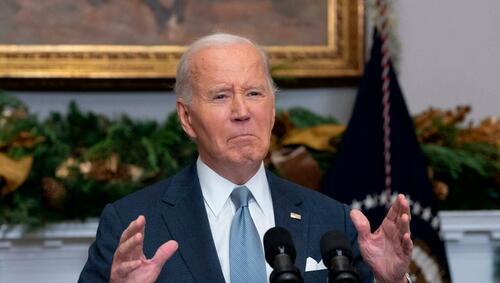
Biden Is Wrong To Double Down On Syria
Authored by Alexander Langlois via American Greatness,
On December 19, the U.S. Department of Defense announced that there are roughly 2,000 troops stationed in Syria – 1,100 more than previously shared with the public. Pentagon spokesperson Major General Patrick Ryder disclosed the new number almost off-handedly, without explanation for the shock news as Syria experiences a generational moment following former President Bashar al-Assad’s regime collapse on December 8. The announcement personifies the ongoing and widespread disdain of American political and military leaders for transparency on military operations abroad.

Indeed, the laxness with which Ryder announced the new deployment numbers is unacceptable. These forces are not, as the spokesperson claimed, simply “temporary rotational forces” but reflect the worst excesses of mission creep that have come to define U.S. military operations in the post-9/11 era. Ryder’s follow-on statements, in the same breath as his claims of the temporary nature of the deployment, highlight this bleak reality: “Right now, there are no plans to cease the defeat-ISIS mission.”
Rather, the Biden administration feels empowered to expand that mission and lie to the American people about what exactly it is doing in Syria. Such an outcome results from unchecked executive power in the U.S. government and Congressional reluctance to question support for anything labeled as counterterrorism (CT) operations. Worse, the announcement comes as news surfaces that U.S. President Joe Biden experienced “good days and bad days” as early as 2021 concerning his mental acuity – another inconvenient fact hidden from U.S. citizens, raising questions regarding who has actually been steering policy in the White House.
The inconvenient truth for Biden’s advisors is simple: U.S. forces continue to operate in a country that has not invited them to establish a presence and without any constitutionally mandated Authorization for the Use of Military Force (AUMF) required to make such military operations legal under U.S. law. Only Congress can pass an AUMF – the president cannot unilaterally declare one. Flimsy arguments connecting the Islamic State to Al-Qaeda – arguing that the former grew out of the latter – are another ugly expansion of unchecked executive power aimed at limiting U.S. citizen input on the critical decisions of their elected officials.
Such a pass must be rejected. For two decades, U.S. officials have worked to expand global military power in a resource-draining deluge of unsustainable overextension. On the same day as Ryder’s announcement, the U.S. Senate passed the National Defense Authorization Act (NDAA) – the primary defense appropriations package – to the tune of $895 billion. As U.S. debt approaches $37 trillion, the government should be more transparent on such issues – not less. Yet rather than taking that approach, the Pentagon failed its seventh straight audit in 2024.
This unacceptable situation is why expanding the defeat-ISIS mission should be rejected, especially given the facts on the ground. To be sure, while the Islamic State has expanded its operations in Syria in 2024, the number of attacks pales in comparison to the height of the group when ISIS actually held and governed territory. With less than 20 attacks in September, compared to hundreds in April 2022, the Islamic State is no longer a serious threat to U.S. interests—and its reach is extremely limited. It has long been unable to conduct international attacks from either Syria or Iraq.
Most of its fighters in these two countries remain in prisons operated by local U.S. partners – namely the Syrian Democratic Forces (SDF) in Syria. While some cite the presence of roughly 10,000 fighters in these prisons as an army-in-waiting for the group, the reality is alternative policy options exist for both securing these prisons and limiting the wider supposed threat while ending – not expanding – the defeat-ISIS mission.
Those options include regional partnerships, not limited to Turkey or the plethora of armed groups operating in Syria today. Given the Islamic State’s inherent weakness, it should not be difficult to establish a sustainable agreement – namely one that ends the U.S. presence in the country by allowing those capable local actors with more of an interest in ending the threat from re-appearing in their communities. An open-ended U.S. presence will not fully resolve this problem, as personified by never-ending CT operations across Africa and Asia with no end in sight.
Ultimately, the issue of U.S. military overreach is bigger than Syria, even if the country is central to debates on U.S. forces abroad. Officials must recognize that U.S. primacy on the regional and global stage does not come from doing everything, everywhere, all at once. Rather, it is achieved through strategic honesty and military restraint that right-sizes efforts abroad based on necessity as the world is – not how unelected officials wish it to be.
Misleading the American public cannot remain the U.S. foreign policy norm, which already discounts the will of the average American citizen in a smugness that has long pervaded the space. As announcements like the one on Syria indicate, the time is now to shift away from this unsustainable and anti-democratic approach.
Tyler Durden
Sun, 12/29/2024 – 22:10














![Nielisz: Power Sobótka. największą popularnością cieszyły się koncerty [ZDJĘCIA]](https://static2.kronikatygodnia.pl/data/articles/xga-4x3-nielisz-power-sobotka-najwieksza-popularnoscia-cieszyly-sie-koncerty-zdjecia-1751631617.jpg)


